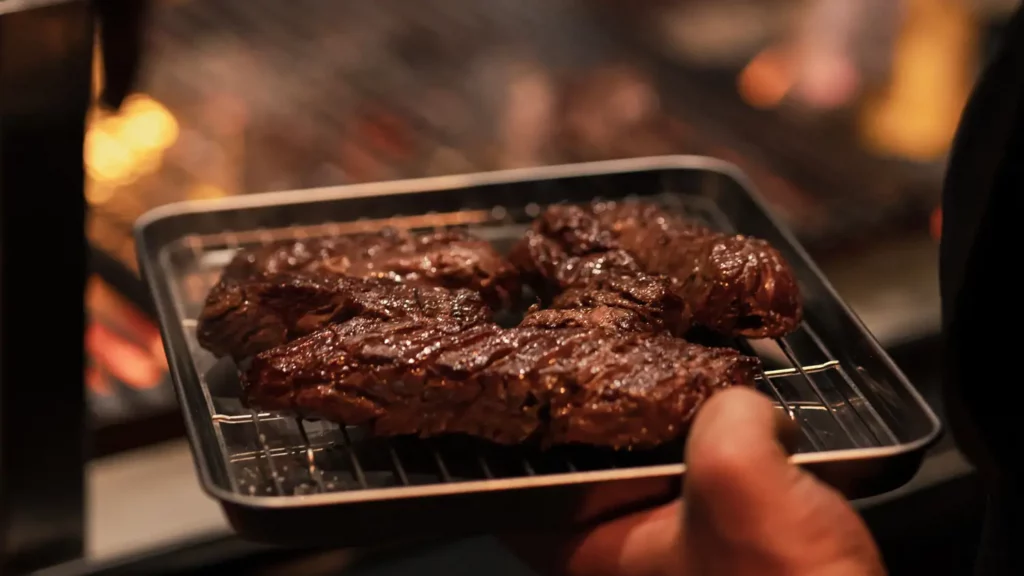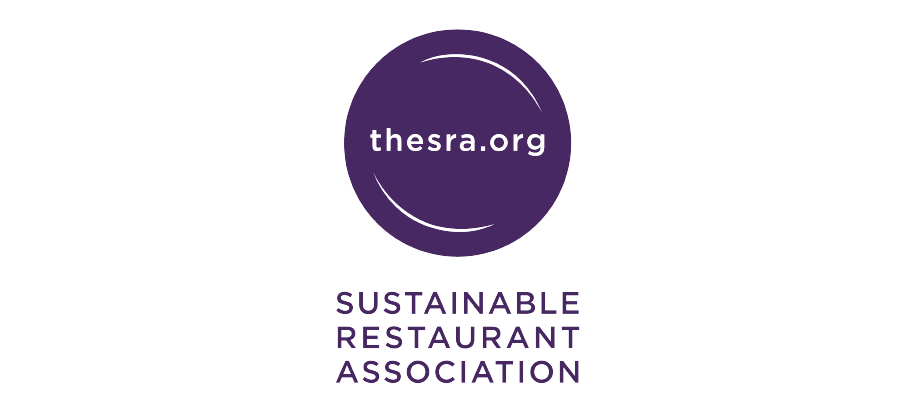A Food Made Good Success Story: Flat Iron
18 October 2024
Share this exclusive content from Saladplate


Photo Credit: The Sustainable Restaurant Association (TSRA)
FLAT IRON WAS FOUNDED WITH THE CONCEPT OF MAKING GREAT QUALITY BEEF AFFORDABLE FOR EVERYONE. WITH RESTAURANTS ACROSS THE UK, THEY FOCUS ON BEEF GROWN IN EXTENSIVE OR REGENERATIVE SYSTEMS, FAVOURING TRADITIONAL BREEDS AND LONGER, SLOWER REARING PROCESSES.
Flat Iron completed the Food Made Good Standard with additional support from our team – this potential for support has since evolved to become our Supported and Facilitated packages, available to any business signing up. They were awarded three stars in January 2024, so we thought it was time for a catch-up! We sat down with the team at Flat Iron to see how they found the process and how sustainability continues to develop at Flat Iron.
“As a business, we have a responsibility to make progress day by day, month by month, and year by year,” says Head of Beef, Fred Smith. “We believe Flat Iron can be a force for good and have a positive impact – on our guests, our teams and the planet.”

Working with beef as your core offering poses its own particular challenges when it comes to sustainability. “It’s challenging to ensure we are doing the right thing while staying true to our brand and what makes us tick as a business,” he continues. “The beef and farming industries have a long way to go to become sustainable, but we are excited to be part of the solution.” At Flat Iron, this includes choosing beef grown in extensive or regenerative systems, favouring traditional breeds and longer, slower rearing processes that prioritise a stress-free life.
In the same year Flat Iron was founded, Founder Charlie Caroll travelled to Yorkshire to meet third-generation beef farmer Charles Ashbridge to talk about what breed, feed and husbandry could make the best beef anyone had ever tried. This conversation provided a flash of inspiration: Flat Iron would have its own herd so they could experiment and learn everything about how to breed and raise the best cattle. Charles became their partner farmer, looking after the 40-strong herd in Yorkshire today. “Together with Charles, we recently set up a lifecycle analysis (LCA) that looked at the environmental impact of the Flat Iron herd on the farm, letting us understand its carbon footprint and identify ways to reduce on-farm emissions,” says Fred. “We’ve learned a lot through this process, and we look forward to sharing our learnings soon. “

Photo Credit: The Sustainable Restaurant Association (TSRA)
Food Made Good Standard at Flat Iron
“As a team of hospitality professionals, we have always been aware of the work of The Sustainable Restaurant Association,” says Sustainability Partner, Cherry Dejos. “When we committed to focus on sustainability, we considered the accreditations that were available for hospitality businesses and chose The SRA’s Food Made Good Standard. It is actually the only holistic sustainability certification scheme focused on hospitality, so it was the perfect fit for us.”

The team was pleasantly surprised by how thorough the evaluation was and found that it brought new clarity. “I’d say to any business considering signing up to the Standard, be open-minded and ready to look at your business and operations in a way that you haven’t quite done before,” Cherry says. “We’d encourage all hospitality businesses to get involved – it’s an intensive but necessary journey.”
Flat Iron was the first restaurant to complete the Standard with additional support from our team of sustainability consultants. This has since evolved to become our Supported and Facilitated packages, available to any business signing up. “We had a great experience. The Standard can seem daunting and overwhelming at first glance, but the team at The SRA is very helpful and responsive – we felt supported throughout the process.”


Photo Credit: The Sustainable Restaurant Association (TSRA)
Their attention to detail when it comes to provenance contributed towards their three-star rating, as did their commitments to food waste reduction targets and their partnership with the Felix Project, a charity committed to fighting hunger and reducing food waste. They have operational targets in place to control energy and water use, as well as broader recycling targets. When they open new restaurants, they’re careful to retain original features and use vintage and reclaimed materials wherever possible. Training and development also plays a big role at Flat Iron (“It’s great to see how engaged in sustainability our teams are,” says Fred) and they do a superb job of communicating their sustainability practices through their website.
Fred says taking the FMG Standard has helped to give the Flat Iron team a direction for their strategy going forward. Recognising the importance of continuing on the journey and incorporating sustainability into long-term plans, he says, “We are proud of our three-star rating, but we definitely want to continue to make progress.” What’s their next step? Recognising that their biggest environmental impact is on-farm, the team is currently exploring what they can do make their beef farming less intensive. “We can’t say much about this at the moment – but we’re excited to get cracking.”
You can learn more about Flat Iron at their website. Find more information about the process of taking the Food Made Good Standard here.

Photo Credit: The Sustainable Restaurant Association (TSRA)
Waliki Coffee, Bolivia.
Photo credit: Ozone Coffee

Photo Credit: The Sustainable Restaurant Association (TSRA)

Source: The Sustainable Restaurant Association



